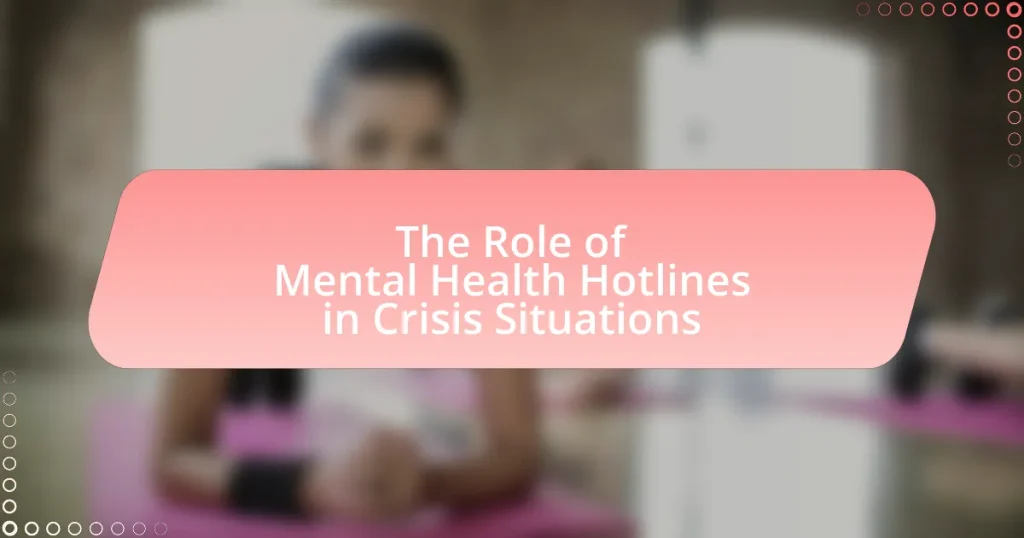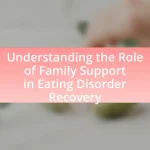Mental health hotlines are essential resources in crisis situations, providing immediate support and intervention for individuals facing mental health emergencies. These hotlines offer confidential access to trained professionals who assess callers’ needs, deliver emotional support, and connect them with further resources. The article explores the operational mechanisms of mental health hotlines, the key services they provide, and their impact on crisis resolution and long-term mental health support. It also addresses the challenges these hotlines face, such as high call volumes and resource limitations, while highlighting the importance of partnerships with local services to enhance the effectiveness of crisis intervention. Additionally, best practices for utilizing hotlines effectively are discussed, emphasizing the significance of preparation and clear communication for callers seeking help.
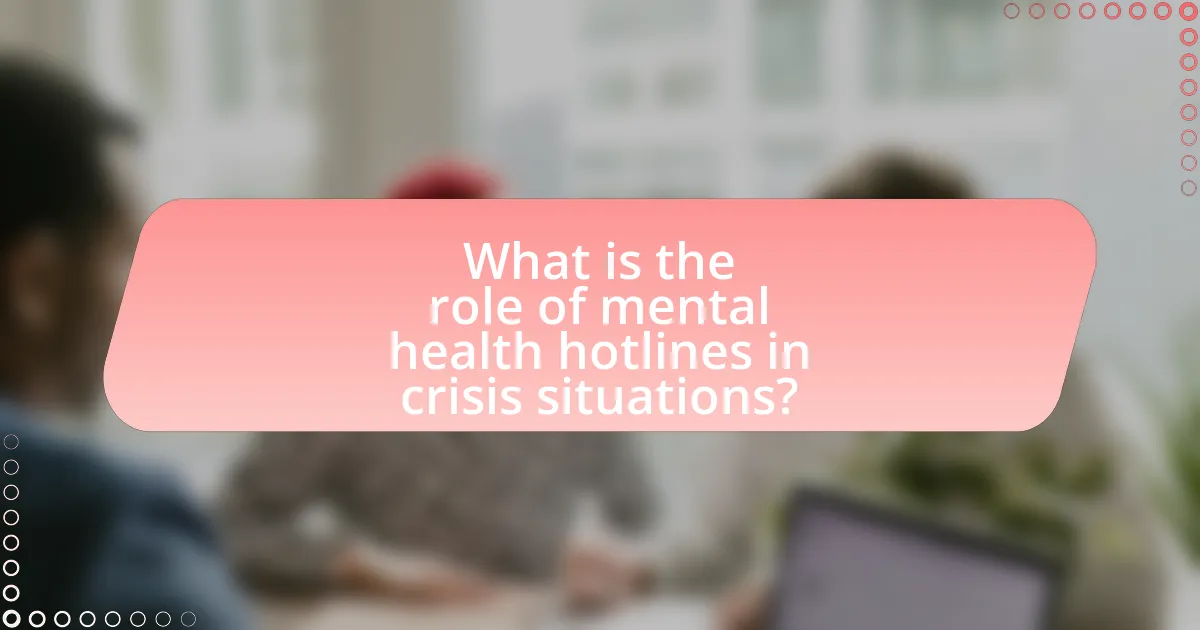
What is the role of mental health hotlines in crisis situations?
Mental health hotlines play a crucial role in crisis situations by providing immediate support and intervention to individuals experiencing mental health emergencies. These hotlines offer a confidential and accessible platform for individuals to discuss their feelings, receive guidance, and obtain resources. Research indicates that timely intervention through hotlines can significantly reduce the risk of self-harm and suicide, as they connect callers with trained professionals who can assess their needs and provide appropriate assistance. For instance, the National Suicide Prevention Lifeline reports that 90% of callers feel better after speaking with a hotline counselor, highlighting the effectiveness of these services in crisis management.
How do mental health hotlines operate during a crisis?
Mental health hotlines operate during a crisis by providing immediate, confidential support to individuals in distress. Trained counselors answer calls, assess the caller’s situation, and offer emotional support, crisis intervention, and resources for further help. For example, the National Suicide Prevention Lifeline, which receives over 2 million calls annually, connects individuals to trained professionals who can help them navigate their crisis effectively. This structured approach ensures that individuals receive timely assistance, which can significantly reduce the risk of self-harm or suicide during critical moments.
What are the key services provided by mental health hotlines?
Mental health hotlines provide immediate emotional support, crisis intervention, and resources for individuals experiencing mental health issues. These services include 24/7 access to trained counselors who can offer guidance, listen to concerns, and help de-escalate crises. Additionally, hotlines often provide information on local mental health services, referrals to therapists or support groups, and follow-up support to ensure ongoing care. The effectiveness of these hotlines is supported by studies indicating that timely access to mental health support can significantly reduce the risk of suicide and improve overall mental well-being.
How do trained professionals assess callers’ needs?
Trained professionals assess callers’ needs by employing active listening techniques, asking targeted questions, and utilizing standardized assessment tools. Active listening allows professionals to fully understand the caller’s emotional state and specific concerns, while targeted questions help clarify the nature of the crisis and the caller’s immediate needs. Standardized assessment tools, such as the Columbia-Suicide Severity Rating Scale, provide a structured approach to evaluate risk factors and determine appropriate interventions. These methods ensure that professionals can accurately identify the caller’s needs and provide effective support tailored to their situation.
Why are mental health hotlines important in crisis intervention?
Mental health hotlines are crucial in crisis intervention because they provide immediate access to trained professionals who can offer support and guidance. These hotlines serve as a lifeline for individuals experiencing mental health crises, allowing them to communicate their feelings and receive assistance without judgment. Research indicates that timely intervention through hotlines can significantly reduce the risk of self-harm and suicide; for instance, a study published in the Journal of Crisis Intervention and Suicide Prevention found that individuals who contacted hotlines reported feeling less distressed and more hopeful after the interaction. This demonstrates the effectiveness of hotlines in facilitating immediate emotional support and connecting individuals to further resources.
What impact do hotlines have on immediate crisis resolution?
Hotlines significantly enhance immediate crisis resolution by providing instant access to trained professionals who can offer support and guidance. Research indicates that individuals who contact hotlines during crises often experience reduced feelings of distress and increased coping strategies. For instance, a study published in the Journal of Crisis Intervention and Suicide Prevention found that 80% of callers reported feeling better after their interaction with hotline counselors, demonstrating the effectiveness of these services in alleviating immediate psychological distress.
How do hotlines contribute to long-term mental health support?
Hotlines contribute to long-term mental health support by providing immediate access to trained professionals who can offer guidance, resources, and emotional support. This immediate intervention can help individuals in crisis stabilize their mental state, which is crucial for preventing escalation into more severe mental health issues. Research indicates that individuals who utilize hotlines often report a reduction in feelings of isolation and an increase in coping strategies, which are essential for long-term mental health improvement. For example, a study published in the Journal of Crisis Intervention and Suicide Prevention found that hotline users experienced significant decreases in suicidal ideation after their calls, demonstrating the effectiveness of these services in fostering ongoing mental health resilience.
What challenges do mental health hotlines face in crisis situations?
Mental health hotlines face several challenges in crisis situations, including high call volumes, limited resources, and the need for trained staff. High call volumes can overwhelm hotline operators, leading to longer wait times and potentially inadequate support for individuals in distress. Limited resources, such as funding and staffing, restrict the ability of hotlines to provide comprehensive services, which can affect the quality of care offered. Additionally, the necessity for trained staff is critical, as operators must possess the skills to handle complex emotional crises effectively; however, recruitment and retention of qualified personnel can be difficult. These challenges can hinder the effectiveness of mental health hotlines in providing timely and appropriate support during crises.
How do resource limitations affect hotline effectiveness?
Resource limitations significantly reduce hotline effectiveness by hindering response times and the quality of support provided. When hotlines lack sufficient funding, staffing, or training, they struggle to handle call volumes, leading to longer wait times and increased caller frustration. For instance, a study by the National Alliance on Mental Illness found that 60% of callers to under-resourced hotlines reported feeling their needs were not met due to inadequate staffing. Additionally, limited resources can restrict the availability of specialized training for hotline staff, which is crucial for effectively managing complex mental health crises. This lack of training can result in inadequate responses, further diminishing the hotline’s ability to provide essential support during critical moments.
What barriers do callers encounter when seeking help?
Callers encounter several barriers when seeking help, including stigma, lack of accessibility, and fear of judgment. Stigma surrounding mental health issues often prevents individuals from reaching out, as they may worry about being labeled or misunderstood. Accessibility issues arise when hotlines are not available in multiple languages or when callers lack access to technology or reliable phone service. Additionally, fear of judgment can deter individuals from disclosing their feelings or situations, as they may be concerned about how their information will be perceived or handled by the hotline staff. These barriers significantly impact the willingness of individuals to seek the help they need during crises.
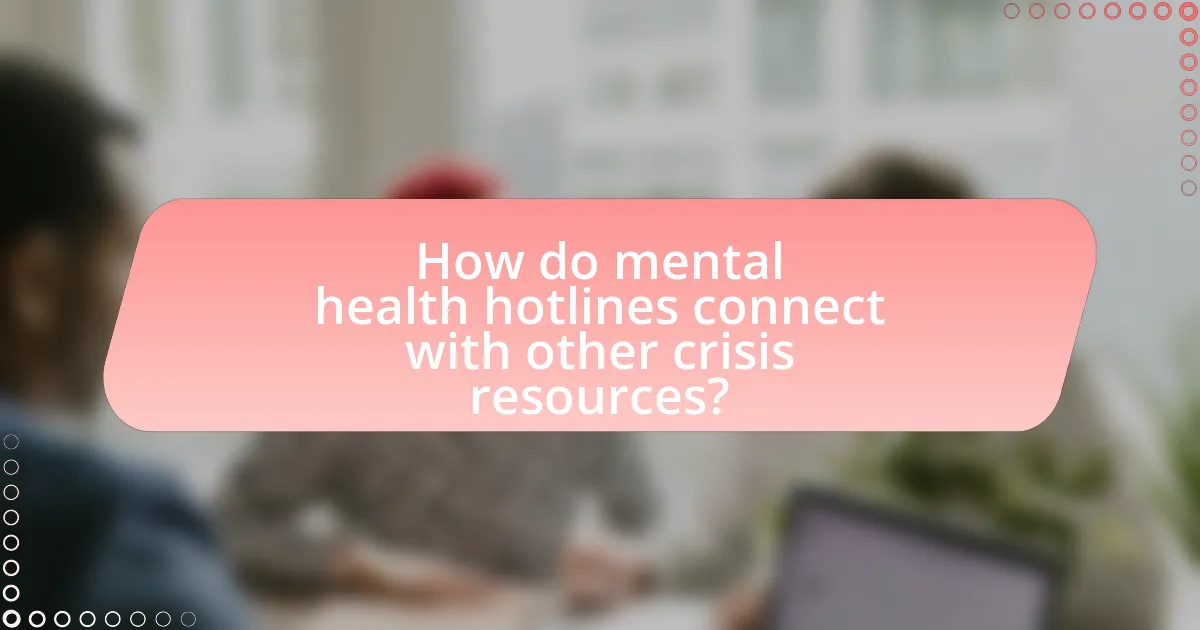
How do mental health hotlines connect with other crisis resources?
Mental health hotlines connect with other crisis resources by establishing partnerships and referral systems that facilitate access to comprehensive support services. These hotlines often collaborate with local mental health agencies, hospitals, and community organizations to ensure that callers receive appropriate follow-up care and resources tailored to their specific needs. For instance, the National Suicide Prevention Lifeline connects individuals in crisis with local emergency services and mental health professionals, enhancing the effectiveness of immediate interventions. This interconnectedness is crucial, as studies show that timely access to mental health resources significantly improves outcomes for individuals experiencing crises.
What partnerships exist between hotlines and local services?
Mental health hotlines often partner with local services such as hospitals, community health organizations, and social service agencies to provide comprehensive support during crises. These partnerships facilitate immediate referrals for callers needing in-person assistance, ensuring that individuals receive timely medical care or counseling. For instance, the National Suicide Prevention Lifeline collaborates with local mental health providers to connect individuals in crisis with nearby resources, enhancing the effectiveness of their intervention efforts. Such collaborations are crucial for creating a seamless support network that addresses the diverse needs of individuals experiencing mental health crises.
How do hotlines refer callers to additional support services?
Hotlines refer callers to additional support services by assessing the caller’s needs and providing tailored recommendations. Trained staff utilize a database of local and national resources, including mental health professionals, support groups, and crisis intervention services, to connect callers with appropriate assistance. For instance, the National Suicide Prevention Lifeline offers referrals to local crisis centers based on the caller’s location, ensuring that individuals receive timely and relevant support. This systematic approach enhances the effectiveness of hotlines in addressing mental health crises and facilitating access to necessary services.
What role do hotlines play in community mental health initiatives?
Hotlines serve as critical access points for individuals seeking mental health support within community mental health initiatives. They provide immediate, confidential assistance, enabling individuals to discuss their concerns and receive guidance from trained professionals. Research indicates that hotlines can significantly reduce feelings of isolation and distress, as evidenced by a study published in the Journal of Crisis Intervention and Suicide Prevention, which found that 70% of callers reported feeling less anxious after their call. Additionally, hotlines often facilitate referrals to local mental health services, thereby enhancing the overall effectiveness of community mental health initiatives by connecting individuals with ongoing support.
How do hotlines ensure confidentiality and trust with callers?
Hotlines ensure confidentiality and trust with callers by implementing strict privacy policies and training staff to handle sensitive information appropriately. These measures include anonymizing caller data, using secure communication channels, and adhering to legal regulations such as HIPAA in the United States, which mandates the protection of personal health information. Additionally, hotlines often provide clear information about their confidentiality practices at the beginning of calls, reassuring callers that their identities and conversations will remain private. This transparency fosters a safe environment, encouraging individuals to share their concerns openly.
What protocols are in place to protect caller privacy?
Mental health hotlines implement several protocols to protect caller privacy, including strict confidentiality policies, secure data storage, and anonymized call tracking. These protocols ensure that any information shared during calls remains confidential and is not disclosed to unauthorized parties. For instance, many hotlines are bound by legal and ethical standards, such as HIPAA in the United States, which mandates the protection of personal health information. Additionally, staff members are trained to handle sensitive information discreetly, further reinforcing the commitment to caller privacy.
How does building rapport enhance the effectiveness of hotlines?
Building rapport enhances the effectiveness of hotlines by fostering trust and openness between callers and responders. When individuals feel a connection with the hotline staff, they are more likely to share their concerns and emotions, which leads to more accurate assessments of their needs. Research indicates that effective communication, characterized by empathy and understanding, significantly improves the likelihood of callers engaging in the support process. For instance, a study published in the Journal of Crisis Intervention and Suicide Prevention found that callers who perceived their hotline responders as empathetic were more likely to report satisfaction with the service and a greater willingness to seek further help. This demonstrates that rapport not only facilitates better communication but also increases the overall efficacy of mental health support provided through hotlines.
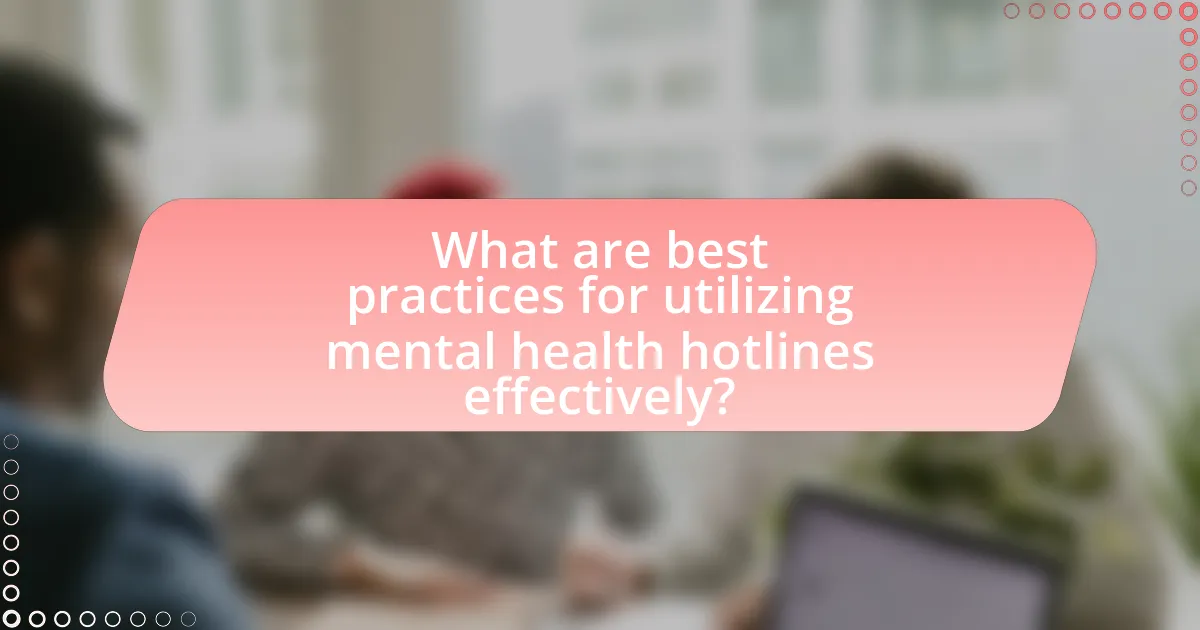
What are best practices for utilizing mental health hotlines effectively?
To utilize mental health hotlines effectively, individuals should prepare by identifying their specific needs and concerns before calling. This preparation allows for a more focused conversation, enabling hotline staff to provide relevant support. Additionally, it is crucial to choose a quiet and private environment for the call, which fosters open communication and minimizes distractions. Research indicates that individuals who articulate their feelings and thoughts clearly during these calls receive more tailored assistance, enhancing the overall effectiveness of the interaction. Furthermore, maintaining an open mind and being receptive to the advice given can lead to better outcomes, as hotline professionals are trained to guide individuals through their crises.
How can individuals prepare for a call to a mental health hotline?
Individuals can prepare for a call to a mental health hotline by identifying their specific concerns and emotions beforehand. This preparation allows individuals to articulate their feelings clearly, which can lead to more effective support. Additionally, having a quiet and private space for the call can help minimize distractions, ensuring a focused conversation. It is also beneficial to have any relevant information, such as medical history or current medications, readily available to share with the hotline counselor. This approach enhances the quality of the assistance received, as counselors can provide tailored advice based on the individual’s situation.
What information should callers have ready before reaching out?
Callers should have their personal information, including their name, contact details, and location, ready before reaching out to a mental health hotline. This information helps the hotline staff provide appropriate support and resources tailored to the caller’s situation. Additionally, callers should be prepared to discuss their current emotional state, any specific issues they are facing, and any previous mental health treatment they may have received. Having this information ready can facilitate a more effective and efficient conversation, allowing the hotline staff to assist the caller more effectively.
How can callers articulate their needs to hotline professionals?
Callers can articulate their needs to hotline professionals by clearly stating their emotions, specific issues, and desired outcomes. Effective communication involves expressing feelings such as anxiety or distress, identifying the nature of the crisis—whether it is suicidal thoughts, substance abuse, or relationship problems—and indicating what kind of support they are seeking, such as immediate assistance or coping strategies. Research indicates that clear communication enhances the effectiveness of crisis intervention, as professionals can better understand and respond to the caller’s situation when they provide detailed information.
What tips can enhance the experience of using a mental health hotline?
To enhance the experience of using a mental health hotline, individuals should prepare specific topics or questions they want to discuss before calling. This preparation helps streamline the conversation and ensures that important issues are addressed. Additionally, choosing a quiet and comfortable environment for the call can minimize distractions and promote a sense of safety, allowing for more open communication. Research indicates that a supportive atmosphere can significantly improve the effectiveness of crisis interventions, as it encourages individuals to express their feelings and concerns more freely.
How can callers follow up after their initial contact with a hotline?
Callers can follow up after their initial contact with a hotline by reaching out again through the same communication channel they used previously, such as phone or online chat. This allows them to continue the conversation, seek further assistance, or clarify any unresolved issues. Many hotlines also provide specific follow-up procedures, such as scheduling a callback or accessing additional resources, which can enhance ongoing support.
What self-care strategies can complement hotline support?
Self-care strategies that can complement hotline support include mindfulness practices, physical exercise, and establishing a support network. Mindfulness practices, such as meditation and deep breathing, help individuals manage stress and anxiety, enhancing emotional regulation. Research indicates that mindfulness can reduce symptoms of anxiety and depression, making it a valuable tool alongside hotline support. Physical exercise, proven to release endorphins and improve mood, can also serve as an effective self-care strategy, with studies showing that regular physical activity significantly reduces feelings of stress and enhances overall well-being. Additionally, establishing a support network of friends, family, or support groups provides social connection and emotional support, which are critical during crises. Studies have shown that social support can buffer against mental health issues, reinforcing the effectiveness of hotline assistance.
